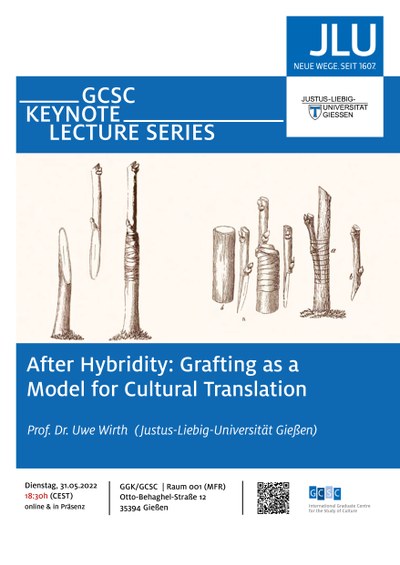SoSe 2022
Summer Semester 2022
Uwe Wirth (JLU Gießen)
After Hybridity: Grafting as a Model of Cultural Translation
31.05.2022, 18:30-20:00 (CEST), GGK/GCSC (MFR) & Online (BBB)
Abstract: "All translation" states Walter Benjamin in his essay The Task of the Translator Walter Benjamin, "is only a somewhat provisional way of coming to terms with the foreignness of languages". The notion of cultural translation as it was developed by postcolonial studies attempts to cope not only with the foreignness of language, but also with 'the other' as a foreigner. In order to come to terms for the various interferences that occur in the course of processes of cultural translation,' Homi Bhabha and other postcolonial theorists have conceptualized interactions between different cultures on the one hand as an "activity of displacement within the linguistic sign", on the other hand as processes of hybridization.
I would like to propose an alternative model for describing processes of cultural translation, namely the model of grafting that has been used not only by Jacques Derrida as a metaphor for textual cut and paste operations, but also by Johann Gottfried Herder and Friedrich Schleiermacher for the purpose of coming to terms with the foreignness of other languages as well as other cultures. Hence, one focus of my talk will be, in which sense grafting can also count as an activity of displacement in the interaction of different languages and cultures.
Annetta Alexandridis (Cornell University)
Plaster Casts in Enlightenment and Colonialist Discourses on Race
07.06.2022, 18:00-20:00 (CEST), GGK/GCSC (MFR) & Online (BBB)
Abstract: Due to their colonialist legacy museums and universities (including at Gießen) have come under pressure to examine their holdings for repatriation of objects and human remains. Understood within a broader call for “decolonizing” Western institutions of knowledge production, such a moment of reckoning invites to revisit other, seemingly unproblematic collections, such as plaster casts of Greco-Roman sculpture. Once a staple of Western style museums around the globe or of departments of archaeology, these replicas democratized access to ancient art, while simultaneously establishing a canon of art through “mere exposure.” Its impact proved to be particularly powerful in the 18th and 19th centuries when cast collections also served to provide ‘scientific’ evidence. Following a longstanding tradition, many enlightenment and colonialist “polymaths” bridged the arts and sciences in their work in a way universities our days would hail as “interdisciplinary”. From that, however, arose a blending of real and ideal, with fateful consequences: in the context of discourses on the “human races” the use of casts established the (white) European body as exemplary, whether as pinnacle of humanity, or as default, unmarked model (man as such). The paper concludes with proposing strategies to address this problematic legacy without completely giving up on plaster cast collections.
The keynote lecture will be followed by a conversation with Prof. Dr. Katharina Lorenz (JLU Giessen).
James M. Harding (University of Maryland)
The Invisible Vanguard: Reflections on Borders, Refugees, and Contemporary Avant-Garde Formations.
21.06.2022, 18:00-20:00 (CEST), GGK/GCSC (MFR) & Online (BBB)
Abstract: At the most basic level, my paper explores the concept of “invisibility” as a key register for a viable theory of contemporary political and artistic avant-gardes. In this respect, it does not take the existence of any contemporary avant-garde for granted as present or visible. Instead, I argue that that very idea of a contemporary avant-garde and a corresponding discourse for it must be distilled from contemporary political struggles and I suggest that in both the U.S. and in Europe those political struggles tend to be about recognition of those who are undocumented and who press over the borders (both physical and cultural) of accepted understanding of the nation-state. As their numbers increase, I argue, so does their political and cultural potential. But as undocumented, they remain an unrecognized and hence invisible avant-garde.
The keynote lecture will be followed by a Conversation with Prof. Dr. Bojana Kunst (JLU), Prof. Dr Gerald Siegmund (JLU) and Tasiana Artsimovich (GCSC).



